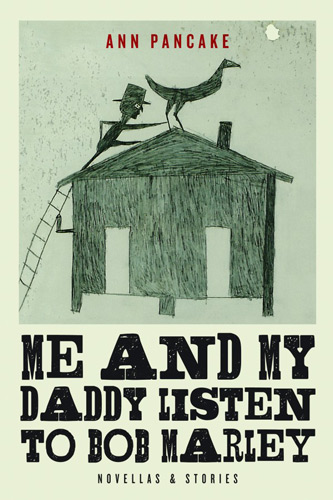Me and My Daddy Listen to Bob Marley
Ann Pancake’s collection of novellas and short stories, is steeped in the culture and dialect of generations of rural West Virginians; moreover, it’s awash with heartache, brutal honesty, mistrust of strangers, and the necessary and stubborn resolve that illuminates the mountain-state people’s passion for family and the place they call home. Ann Pancake’s collection of novellas and short stories, is steeped in the culture and dialect of generations of rural West Virginians; moreover, it’s awash with heartache, brutal honesty, mistrust of strangers, and the necessary and stubborn resolve that illuminates the mountain-state people’s passion for family and the place they call home.
The collection opens with the novella “In Such Light,” a post-coming-of-age story of college freshman Janie’s exploration of relationships through not only her own eyes, but through those of her near-constant summer companion, her mentally challenged uncle, Bobby. Janie’s journey toward self-acceptance comes with its fair share of sorrow and grief as she faces her many fears: fear of always being on the outside of things, of disappointing her grandparents and not protecting her uncle, of not finding a man who will love her, fear of who she might become—and more than any of these—fear of who she might already be. Janie expresses these feelings of ineptitude and humiliation with plain-spoken eloquence when she and Uncle Bobby hide a night of drunken carousing from her grandparents, with whom they are living, by sitting out on the porch until her grandparents fall asleep. But then her grandmother steps out to bid them goodnight:
The front door cracked. “Can you all please turn out the lights and lock the door before you go to bed?” her grandmother called. “And sleep tight.”
Shame geysered through Janie again, as deep and shuddery as grief. And then, it was grief. Because her grandparents were among the very few people in the world who loved her, she knew this, and they were the only ones who saw her not as she was, but as she could be, yet she could not stop being as she was.
Pancake’s short story “Arsonists” also deals with resigned shame, not only of one’s self, but of the hopelessness of one’s life situation. Tuft, West Virginia residents are being forced by coal-company owners to leave their homes (often on land that’s been in the family for generations), because the blasting during mountaintop-removal mining is cracking house walls and foundations and filling the air with dust so thick folks can’t see or breathe. Once the families have fled the area, one by one, the empty homes are furtively burned to the ground by coal-company arsonists—a threat to those who steadfastly refuse to leave: “The mysteriousness of it all terrorized everyone even worse, and more people sold, just like the coal company wanted. If they couldn’t shake them out, they’d burn them out. . . .”
The Appalachian trait of mistrusting outsiders is proven both rational and reasonable here, and again in the short story “Dog Song.” In this story, main character Matley proves that man can indeed become an island unto himself when contractors buy up the land all around him, building subdivisions of upscale homes for tourists to become residents.
Even some of the children in Pancake’s collection are wary of anyone not born and bred in these mountains, as examined in “Coop,” a story set in a summer camp for impoverished girls. Perhaps the only thing worse than taking away an Appalachian’s land is trying to take their sense of pride, and local camp director Mrs. Junkins’s replacement, Dr. Maxine, must learn this lesson from the children in her charge:
That year, though, Mrs. Junkins didn’t come. Died, the older girls whispered. Just plain wore out, said the cook. Instead, they brought in a woman called Dr. Maxine from someplace else, Carly heard that right away in her voice. And the second thing Carly noticed was how she smiled, tight, all the time over nothing. Like she knew something to smile about none of them ever would.
Pancake’s title story, “Me and My Daddy Listen to Bob Marley” relates the story of three-year-old Mish who, though too young to understand the poverty in which he lives, is nonetheless old beyond his years, old enough to know right from his daddy’s wrongdoing and brave enough to do something about it.
While Pancake’s collection depicts the most impoverished of West Virginians—the born-and-bred natives who thrive in the mountain state aren’t examined in these stories—her characters aren’t stereotyped caricatures; they are every American, regardless of state province, who has suffered loss at the hands of greed, dishonesty, and corruption. No, Ann Pancake does not whitewash her characters or their very real problems to make them pretty, but that’s okay: their raw courage and human spirit make each one of them beautiful.





